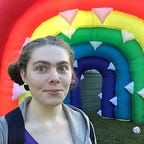Ana Pascal
This piece was written and performed as part of #NYWF2018, for the Women and Femmes reading event on Thursday evening.
I want to talk about powerful Femme Ana Pascal, from the film Stranger Than Fiction. This film, it’s all about the power of femmes and of literature. It’s perfect. What better a place than a writers festival to talk about the movie that makes books better; that made me better.
Femme is a queer identity that I hold onto strongly. Up the top, I wanna create the distinction as separate from feminine, which is a wonderful adjective for appearance. Capital F Femme, as in Queer Femme, as in the femme of magic and marvel, this is what I love, and what I love doesn’t really let itself be explained easily.
My partner is currently studying queer femininity, and when I have asked her in the past what her work has unveiled about a possible definition for this term is, she first laughs at me, and then shrugs, soft shoulders all the way up to her ears. There is a mystery to Femme, an unknowing, and yet in many ways, a wish to be known. Perhaps just an obfuscation, the painted face behind the fan. We continue, regardless — the definition may never come but we will.
Ana Pascal, from the film Stranger Than Fiction, plays a small but crucial part of an ensemble full of extraordinary women. There are two other women of note, but that counts as full of women for a modern movie still, so I take it where I can get it. Alongside professional, intelligent and formidable, the woman you call when no one else will do, Penny Escher, and award winning novelist and total relatable anxious wreck Karen Eiffel, she is surrounded by women who flesh out their own worlds.
And yet Ana stands out. Ana Pascal, sweet bisexual firebrand, Harvard law drop out, anarchist baker, and powerful, beautiful Femme. My heart belongs to you, and this is a love poem.
Oh Ana Pascal, that you are described through the gaze of the main character Harold whatever-his-face is relevant, it’s a part of you, the way that Femmes are so often viewed through lenses not of our own making or polishing, but remake ourselves despite this.
Your clear bisexuality is like my own, not letting men in until they’ve shown themselves to be able to give more, do more, be more. You are the pivot of the film, remaking Harold’s life for a betterment that changes his future until he learns to dream of something bigger than himself in turn. Femmes are sometimes mistaken for the manic pixie dream girls of film’s murky making, but we also constantly seek to change ourselves, to better ourselves. There is so much room for expansion, and we kick at it. We do not settle, we do not sit still.
Ana Pascal, last name from Blaise Pascal, French mathematician and philosopher. her heart and soul stems from someone who thought bigger, thought of the conditions of better, and dreamed for them. Darling Ana, who figured if she was going to make the world a better place she’d do it with cookies.
Ana Pascal, Harvard law drop out, who went to college so she could make the world a better place, who addresses a letter to the tax office “Dear Imperialist Swine?” like I am still tempted to do some days — all this bloody women’s work that needs to be done and I’d hope for at least some kind of tax write-off for my lipstick.
Ana Pascal, sweet darling pastry chef, making oatmeal cookies, peanut butter bars, and dark chocolate macadamia nut wedges, bringing joy to the people studying around you, to your community. a linch pin for those who sought to create change. Soon it was ricotta cheese and apricot croissants, and mocha bars with an almond glaze, and lemon chiffon cake with a zesty peach icing. Her tattooed arms kneading dough, in and out across the sturdy benchtop, pressing fingertips, flour stippled across her brow and her collarbones; Femmes as strength as much as they are sustenance.
Ana Pascal, radical queer with a capital fuck you, who names her bakery The Uprising, and serves local undernourished and homeless people because someone has to, and so she does. She dives into love after checking the water, she feels, she yearns, she wants. The myth of feminine desire as a dry pool is long gone, and Femmes are wet, sticky, pulsing like surf. When the storm surge hits, you know Femmes are about.
Ana Pascal, kind, charming giver of care. You are not wife material, you are star material, you are matter and atoms spun up with love or chance or something bigger again. The universe breathes you into being and you use that breath to look after others. This film, it’s all about the power of Femmes and of literature, and how what makes us better is what’s worth keeping around, growing from, finding more of.
Ana Pascal, lying on the hospital bed of someone you love, scared silly and thankful. The film ends with the author Karen Eiffel narrating, as she says:
And, fortunately, when there aren’t any cookies, we can still find reassurance in a familiar hand on our skin, or a kind and loving gesture, or subtle encouragement, or a loving embrace, or an offer of comfort. … And we must remember that all these things, the nuances, the anomalies, the subtleties, which we assume only accessorize our days, are effective for a much larger and nobler cause. They are here to save our lives.
And in my mind, nothing could be more Femme than that.
